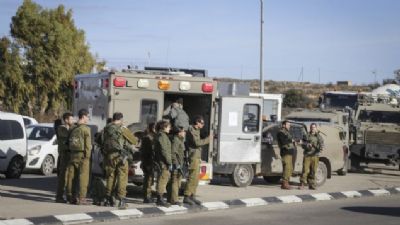A Palestinian man wielding a knife rushed at IDF soldiers at the Gush Etzion Junction in the West Bank on Friday and was shot dead, the Israeli military said.
"The Palestinian arrived at the scene armed with a knife and ran toward IDF soldiers," the army said in a statement. "Forces fired shots at the assailant. No injuries to IDF forces were reported."
The assailanst was identified by Palestinian media as Abdullah Takaatka, 24, from Bethlehem.
The junction, in the Etzion Bloc south of Jerusalem, was a focal point for Palestinian attacks during a wave of violence that broke out in the fall of 2015.
Palestinian rioting was reported on Friday in several locations in the West Bank, including in nearby Bethlehem and Hebron.
Prayers in and around the Temple Mount compound in Jerusalem's Old City ended peacefully, however; Israel had restricted entry at the compound itself to men aged over 50 and women of all ages.
An IDF soldier was lightly injured in a rock-throwing incident near the Qalandiya checkpoint where Palestinian rioters were clashing with security forces. The soldier was taken to hospital with light head injuries, the army said.
The attempted stabbing and clashes came amid heightened tensions in Jerusalem and the West Bank after nearly two weeks of clashes over security arrangements at the Temple Mount, put in place in the wake of a July 14 terror attack in which three terrorists shot dead two Israeli police officers near the compound with weapons they had smuggled onto the site.
Extra police and border guard officers were deployed to Jerusalem hotspots Friday, and the military beefed up its presence in the West Bank, a week after heavy clashes in the capital and West Bank left five Palestinians dead and saw a Palestinian terrorist stab to death three Israelis at their Shabbat meal in the West Bank settlement of Halamish.
Israel rolled back this past week all the security equipment, including metal detectors, railings and scaffolding for cameras, at entrances to the Temple Mount - which houses the Al-Aqsa Mosque and is known to Muslims as Haram al-Sharif (Noble Sanctuary) - ahead of the feared violence in Jerusalem and the West Bank on Friday.
Palestinians had celebrated Thursday morning as Israel rolled back the security measures and thousands of worshipers heeded a call by Muslim authorities to assemble for prayers at Al-Aqsa for the first time after boycotting the site for 11 days.
The Temple Mount is an emotional issue at the heart of the Israeli-Palestinian conflict. Even the smallest perceived change to delicate arrangements pertaining to the site sparks tensions.
Jews revere the hilltop compound as the Temple Mount, site of the two Jewish biblical temples. It is the holiest site in Judaism, and the nearby Western Wall, a remnant of one of the temples, is the holiest place where Jews can pray. The walled compound is Islam's third-holiest site after Mecca and Medina in Saudi Arabia.
Israel had faced intense pressure over the security devices and said it plans to install sophisticated cameras instead. Palestinian leaders and Muslim clerics had insisted Israel restore the situation at the shrine to what it was before the attack.
July 28, 2017
Palestinian tries to stab soldiers in West Bank
Date
July 28, 2017
Title
Palestinian tries to stab soldiers in West Bank, is shot dead,
The Times of Israel
Original Source

